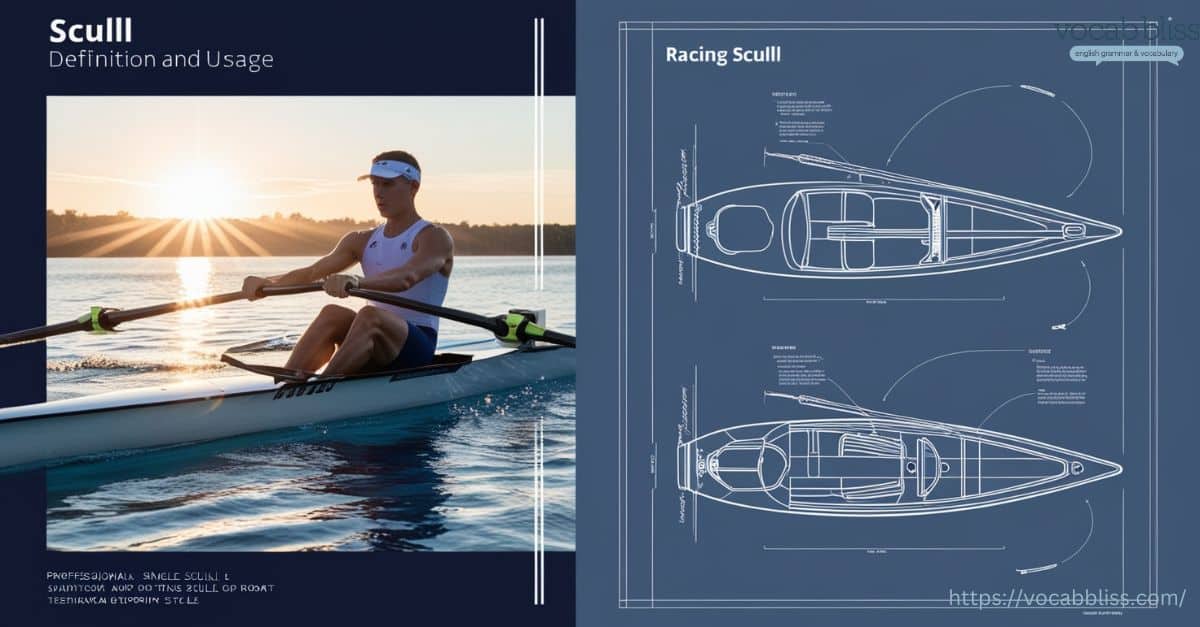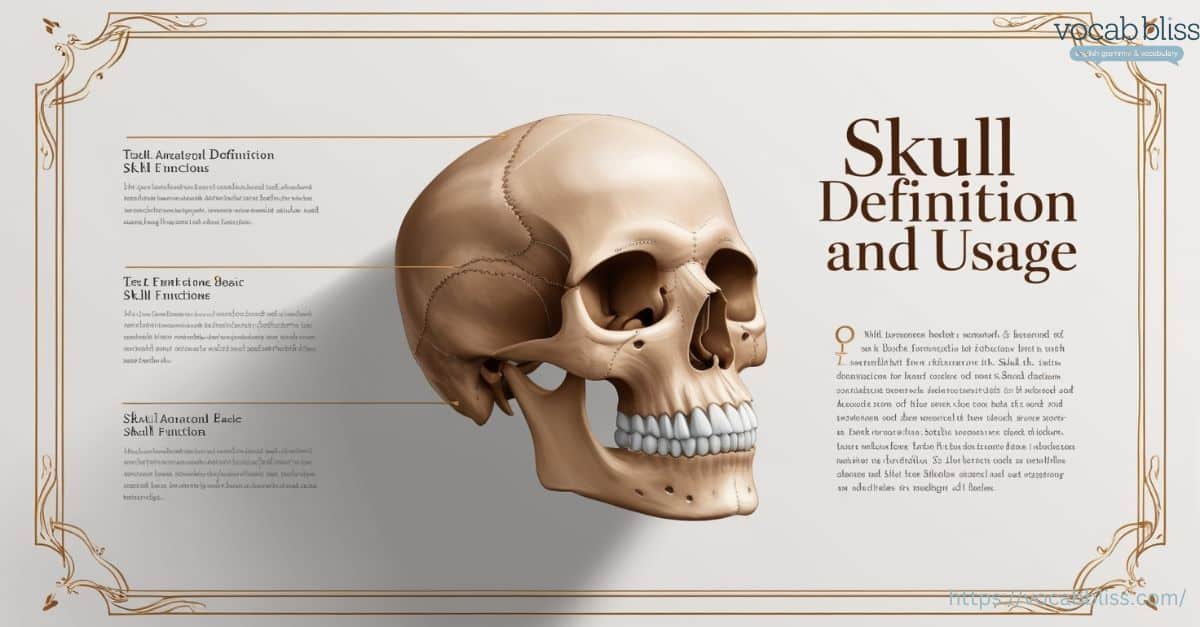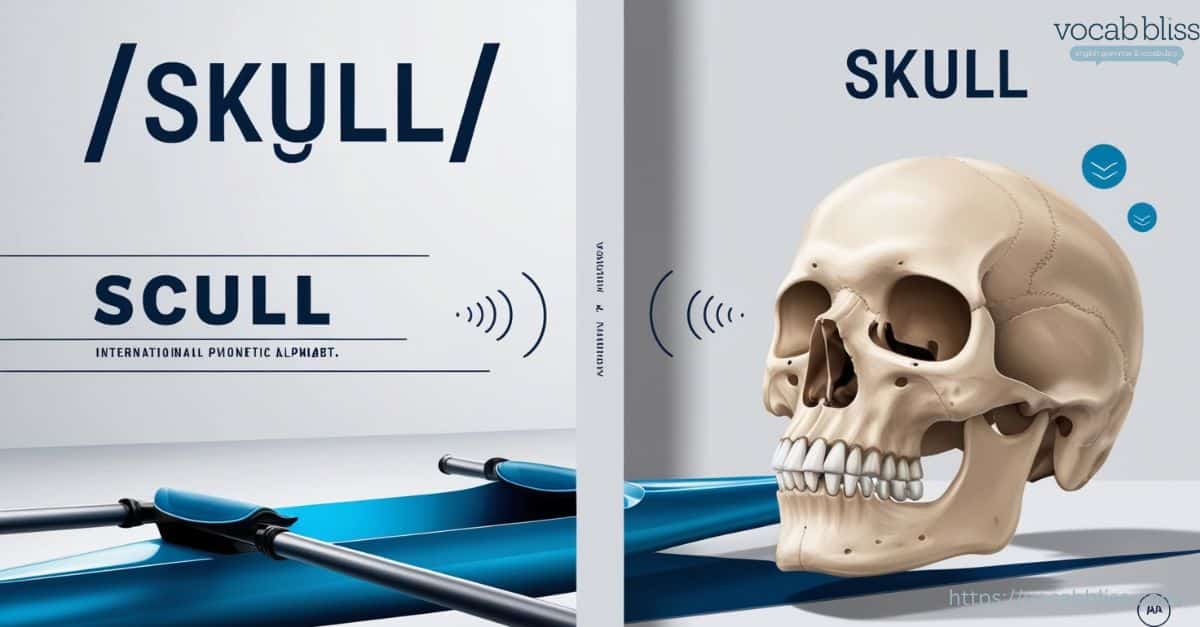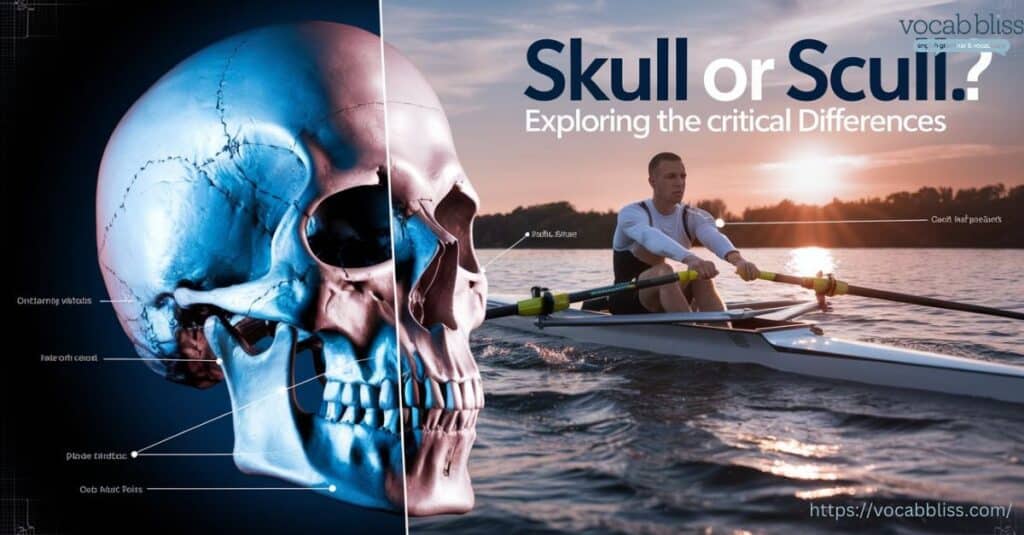When it comes to words like “skull or scull”, the similarity in sound often causes confusion. These two words, though spelled almost identically, carry vastly different meanings and are used in entirely different contexts.
If you’ve ever wondered whether to use “skull” or “scull” in a sentence—or what each term actually means—you’re not alone. This comprehensive guide will clarify the difference between scull and skull, covering their definitions, uses, and much more.
Quick Summary
In conclusion, while “skull or scull” may sound alike, they have distinct meanings and uses. “Scull” is primarily associated with rowing, referring to a type of oar, a small boat, or the action of rowing. As both a noun and a verb, it’s commonly used in sports and boating contexts. On the other hand, “skull” refers to the bony structure that protects the brain, primarily used in anatomy and often carrying symbolic meanings of strength, wisdom, or mortality. Although they share similar pronunciation, their difference in usage is clear, making context the key to understanding which word is intended.
Explore further: Cubical vs Cubicle: Finding the Perfect Fit for Your Space.
Understanding Skull or Scull
The words “skull or scull“ might sound similar, but their meanings couldn’t be more distinct. While one refers to a crucial part of the human anatomy, the other is closely tied to the sport of rowing. Understanding their definitions and uses is essential to avoid embarrassing mistakes in writing or conversation.
Scull Definition and Usage

Definition
The word “scull” primarily refers to rowing and small boats. As a noun, it describes a narrow, lightweight boat designed for competitive or recreational rowing. It can also refer to the oars used to propel such boats. As a verb, “to scull” means to row a boat using one or two oars, typically in a specific technique where each hand operates a separate oar.
In rowing, sculls are essential equipment, and “sculling” is a common term for this style of propulsion, particularly in sports like competitive rowing or regattas.
Origin
The word “scull” has Scandinavian roots, deriving from the Old Norse word “skola,” meaning “to wash” or “to rinse.” Over time, its meaning shifted to describe the back-and-forth motion associated with rowing. Historically, sculls were integral to fishing communities and trade, with small, maneuverable boats used for navigating tight waterways. Today, sculls are a staple in competitive rowing and recreational water sports.
Usage in Sentences
Here are a variety of examples to show how “scull” is used in different contexts:
Literal Usage:
- The rower expertly maneuvered the scull through the narrow canal.
- In competitive rowing, athletes often train in single or double sculls to perfect their technique.
- She decided to scull along the river to enjoy the calm morning.
Metaphorical Usage:
- He had to scull through the challenges of his new job, one careful stroke at a time.
- The writer’s words acted as oars, helping readers scull across the sea of ideas.
Key Questions About Scull
What is a scull?
A scull can refer to:
- A type of narrow, lightweight boat used in rowing sports.
- The oars used to propel such a boat.
- The act of rowing itself when performed with sculls.
Is it skulling or sculling?
The correct spelling is “sculling.” This refers to the rowing technique where a person uses two oars, one in each hand, to move a boat. “Skulling” is a common misspelling and should be avoided.
What does scull mean in slang?
In informal contexts, “to scull” can mean to drink something quickly, especially in Australia and New Zealand. For example, “He had to scull a drink after losing the bet.”
Related Words
Here are some synonyms or alternate terms for “scull”:
- Oar: A general term for the tool used in rowing.
- Rowboat: A broader term for boats propelled by oars, including sculls.
- Sweep rowing: A rowing style distinct from sculling, where each rower uses one oar with both hands.
Skull Definition and Usage

Definition
A “skull” is the bony framework of the head in vertebrates, encasing and protecting the brain, sensory organs, and primary structures like the eyes and ears. In anatomy, it serves as both a shield for vital organs and a foundation for facial features. Symbolically, the skull has long been associated with mortality, wisdom, and even rebellion, as seen in its frequent use in art, literature, and cultural imagery.
Origin
The word “skull” originates from the Old Norse term “skalli,” meaning “bald” or “a bare head.” Over centuries, it evolved to denote the bony structure of the head. Its use has expanded beyond anatomy, gaining metaphorical and symbolic meanings in various cultures and languages.
Usage in Sentences
Scientific Context:
- The skull consists of 22 bones that are fused together, forming the cranium and facial skeleton.
- Paleontologists discovered a dinosaur skull that provided insights into its diet and behavior.
Literary Context:
- “Alas, poor Yorick! I knew him, Horatio,” Hamlet exclaimed, holding the jester’s skull in Shakespeare’s play.
- The pirate flag, adorned with a skull and crossbones, struck fear into sailors.
Colloquial Expressions:
- “Use your skull!” (Meaning: Think or use your head.)
- “He’s as stubborn as a mule; nothing gets through his thick skull.”
Pronunciation Variations
British English:
In British English, “skull” is pronounced as /skʌl/, with a short “u” sound, almost like “skull” rhyming with “dull.”
American English:
In the U.S., “skull” is also pronounced as /skʌl/ but often with a more pronounced emphasis on the “sk” sound.
Scottish English:
Scottish pronunciation sometimes adds a subtle rolling of the “l,” making it sound slightly more resonant.
Common Questions About Skull
How common is the noun “skull”?
The term “skull” is very common, especially in scientific, medical, and educational contexts. It’s frequently used in anatomy to describe the head’s structure and appears often in literature and everyday speech.
How is the noun “skull” pronounced in different regions?
- British English: /skʌl/ (short “u”).
- American English: /skʌl/ with more clarity in the “k” and “l.”
- Scottish English: /skʌl/, sometimes with a slightly rolled “l.”
Can “skull” be used metaphorically?
Yes, “skull” is often used metaphorically. Examples include:
- Symbol of mortality: “The artist’s work prominently features skulls as a reminder of life’s fragility.”
- Representation of toughness: “He has a hard skull, both literally and figuratively.”
- Wisdom or thought: “Inside that skull of his lies a brilliant mind.”
Skull or Scull: Definitions, Parts of Speech, and Pronunciation
Understanding the differences between “skull or scull” can save you from potential miscommunication. Although these terms sound similar, their meanings, parts of speech, and usage vary significantly. Below is a detailed comparison, including a table for clarity.
Definitions and Parts of Speech
- Scull:
As a noun, “scull” refers to a type of oar or a small boat propelled by oars. It also describes the act of rowing using a sculling technique.
As a verb, “to scull” means to row a boat using sculls or to propel a boat by rowing with a single oar. - Skull:
As a noun, “skull” refers to the bony structure in vertebrates that protects the brain and supports the face. It has both anatomical and symbolic meanings, often representing mortality, strength, or wisdom.
Pronunciation
While “scull” and “skull” are nearly identical in sound, subtle nuances exist depending on regional accents:
- Scull: Pronounced as /skʌl/ (rhymes with “dull”).
- Skull: Also pronounced as /skʌl/ (rhymes with “dull”), but with regional variations like a slightly stronger emphasis on the “k” sound in some accents.
Comparison Table
| Aspect | Scull | Skull |
|---|---|---|
| Definition | A type of oar, small boat, or rowing method. | The bony structure of the head in vertebrates. |
| Part of Speech | Noun, Verb | Noun |
| Context of Usage | Rowing, boating, sports terminology. | Anatomy, symbolism, everyday language. |
| Pronunciation | /skʌl/ (similar to “dull”). | /skʌl/ (similar to “dull”). |
| Symbolism | Rarely symbolic; functional term. | Frequently symbolic; represents mortality, strength, or wisdom. |
| Common Phrases | “Scull the boat,” “sculling competition.” | “Thick skull,” “cracked skull,” “skull and crossbones.” |
Key Takeaways
- Similar Pronunciation: Both words sound alike, but their meanings are entirely distinct.
- Context Matters: Understanding whether the term is used in a rowing or anatomical context helps clarify intent.
- Remember the Parts of Speech: “Scull” is versatile, acting as both a noun and a verb, while “skull” is strictly a noun.
skull vs scull in a Nutshell
At a glance, “scull vs skull” may sound identical, but their meanings and applications are worlds apart. Here’s a quick summary of their key differences:
- Meaning:
- Scull: Refers to a type of oar, a small rowing boat, or the act of rowing using sculls.
- Skull: Refers to the bony structure in vertebrates that encases the brain.
- Parts of Speech:
- Scull: Functions as both a noun (e.g., the boat or oar) and a verb (e.g., to row).
- Skull: Functions only as a noun.
- Usage Context:
- Scull: Commonly used in rowing, sports, and boating contexts.
- Skull: Used in anatomy, symbolism, and casual language to describe the human or animal head.
- Symbolism:
- Scull: Rarely symbolic, more functional.
- Skull: Often represents mortality, wisdom, or strength in literature and culture.
- Pronunciation:
- Both are pronounced /skʌl/, though slight regional variations may exist.

Everyday Usage Examples
Let’s see how these words work in real-life scenarios:
- “The athlete trained with her sculls every morning before dawn.”
- “Archaeologists discovered an ancient skull buried under the site.”
- “The sculling team won the championship after months of rigorous training.”
- “The X-ray revealed a fracture in the base of the skull.”
How to Remember skull vs scull
Struggling to differentiate between the two? Here’s an easy mnemonic:
- Scull = Sport: Connect the word to rowing, boats, and oars.
- Skull = Skeleton: Relate it to anatomy and the head.
Skull or Scull: Side-by-Side Comparison
| Feature | Scull | Skull |
|---|---|---|
| Meaning | Small boat or oar; rowing technique. | Bone structure protecting the brain. |
| Common Context | Competitive rowing, nautical terms. | Anatomy, symbolism, metaphors. |
| Pronunciation | Identical: [skuhl]. | Identical: [skuhl]. |
Fun Facts About scull or skull
- The human skull consists of 22 bones, including the cranium and facial bones.
- Sculling, as a sport, has been part of the Olympics since 1900.
- Sculling beer is a common party game in Australia and New Zealand.
Conclusion
Mastering the distinction between “scull or skull” is simpler than it seems. By focusing on context and understanding their definitions, you can confidently use these words in writing and conversation. Whether you’re discussing anatomy or the art of rowing, knowing the difference can elevate your communication. So, next time you encounter these terms, you’ll know exactly which one to use!
FAQs about skull or scull
What is a scull?
A scull is a narrow boat propelled with oars or the oars themselves.
Is it skulling or sculling?
The correct spelling is sculling when referring to the act of rowing a scull.
What does scull mean in slang?
In slang, scull a drink means to consume it quickly, often in one go.
What is the difference between scull and skull?
The word scull pertains to boats and rowing, while skull refers to the bony structure in the head.
How do you spell skull?
The correct spelling is skull, with two Ls.
What is skul meaning?
Though not a standard word, “skul” could be a misspelling of “skull.”







